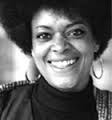|
Miltona Mirkin Cade was born March 25th, 1939 in New York City where she was raised by her mother in a single parent home. She was a student of the Harlem Renaissance and was encouraged by her mother to become a writer. She excelled in school, with the support of her mother she graduated high school six months ahead of her class. Bambara graduated from Queens College in 1959 with a Bachelor’s Degree in Theater Arts and English. That same year she published her first short story in Vendome Magazine titled “Sweet Town.” During the 1960’s Bambara lived in Milan, Italy for a year before returning to New York and becoming a social worker. She also became an occupational therapist, director of programs in her neighborhood, directed a theater program, gained her Master’s degree in modern American fiction at New York City College, and published her short stories in Redbook Magazine. Bambara taught at City College from 1965 to 1969 when she became an Associate Professor of English at Rutgers University. She would find her grand-mother’s sketchbook which was inscribed with the name “Bambara,” she eventually changed her name legally to Toni Cade Bambara in 1970. Later that year she published her first book The Black Woman: An Anthology, which profiled black women and their issues with racism in America. In 1971 she published her second book Tales and Stories for Black Folks. In 1972 she published her collection of short stories titled Gorilla, My Love. Bambara studied women’s organizations in Cuba and Vietnam from for two years. She was interested in how these movements were effective and how she could use the information for her people. Atlanta, Georgia became the home of Bambara and her daughter in 1974 as she began teaching at Spelman College. While at Spellman she created the Pamoja Writer’s Collective, an organization she used to help foster the next generation of black writers. Bambara published her second short story book, The Sea Birds Are Still Alive in 1977; in 1980 she published her award winning book The Salt Eaters. In 1981 Bambara was awarded the National Endowment for the Arts Literature Grant because of her excellent publications. She would write and narrate the script for the documentary The Bombing of Usage Avenue in 1986, later that year she would win the Best Documentary Award from the Pennsylvania Association of Broadcasters. She also won the Documentary Award from the National Black Programming Consortium in 1986. Bambara moved to Philadelphia with her daughter in 1987, published two Novels and wrote nine screenplays. She was diagnosed with colon cancer in 1993 and eventually succumbed to the cancer in 1995. Bambara used her voice to shed light on the plight and injustices black people were facing in America. She displayed the African-American with dignity, intelligence, honor and creativity. She also believed in empowering the next generation, often using her platforms to cultivate and promote the talents of up and coming writers. She understood that it was her duty to become an example of excellence for her people. Mrs. Toni Cade Bambara, we stand on your shoulders. J.A. Ward References:
http://archive.csustan.edu/english/reuben/pal/chap10/bambara.html http://www.fembio.org/english/biography.php/woman/biography/toni-cade-bambara/
1 Comment
cristina iuli
12/15/2023 11:53:15 pm
Hello,
Reply
Leave a Reply. |
Details
Categories
All
Click Here to join our mailing list
|
Contact Us: |
Connect With Us |
Site powered by PIT Web Design


 RSS Feed
RSS Feed



